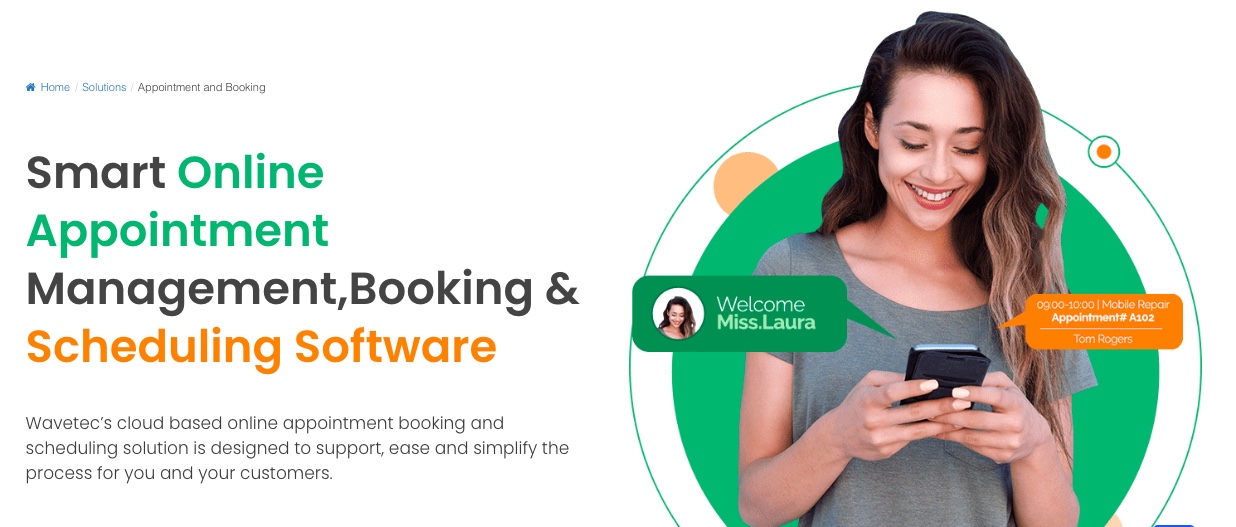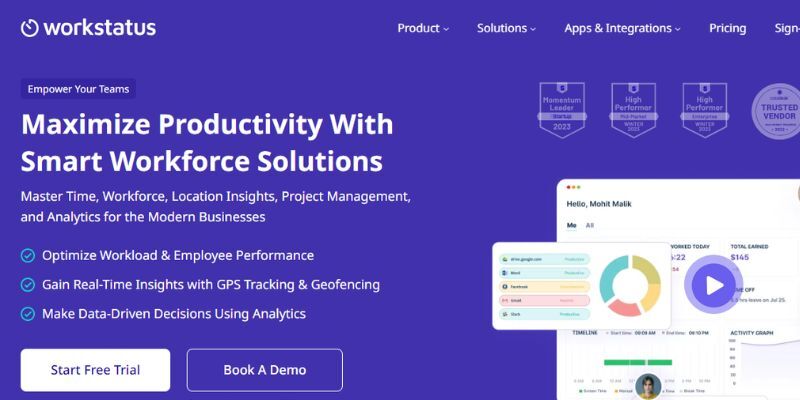In the complex world of healthcare, getting the right person to the right place at the right time is crucial. Imagine a hospital without a schedule – it would lead to weak operational performance and poor customer feedback!
That’s where the best healthcare scheduling software systems come into the picture.
This article delves into the world of healthcare scheduling software systems and why they are so essential. We’ll explore how these digital tools help hospitals, clinics, and healthcare centers run smoothly.
From ensuring that appointments are never missed to making sure that doctors and nurses are where they need to be, scheduling software plays a vital role.
We will examine the scheduling software designed specifically for healthcare settings. These solutions are instrumental in preventing appointment overlaps and ensuring that medical professionals are available when needed.
By the end of this article, you will clearly understand how these software systems are indispensable in the modern healthcare landscape.
What Is Patient Scheduling Software?
Patient scheduling software is a specialized tool designed to manage and organize appointments within a healthcare facility. This software streamlines the process of booking and coordinating patient visits, ensuring that medical professionals are available to provide care when needed.
With medical scheduling software, staff can efficiently allocate time slots, preventing double bookings and reducing wait times. It also allows patients to request appointments online, view available slots, and receive reminders, enhancing convenience and accessibility.
Additionally, this software often integrates with electronic health records (EHR) systems, enabling seamless access to patient information.4
Overall, patient scheduling software is a vital component of modern healthcare administration, optimizing the scheduling process for both healthcare providers and patients. It improves efficiency, reduces administrative burdens, and ultimately leads to better patient care.
Top 20 Medical Scheduling Software

Now, let’s dive into the top 20 medical scheduling software solutions. These user-friendly systems are tailored to make queue management a breeze, whether you’re in a bustling hospital or a smaller clinic. They’re here to ensure your scheduling process is efficient and effective.
1. Wavetec

Wavetec stands out with its innovative healthcare scheduling software, aimed at optimizing patient appointments and enhancing clinic efficiency.
The platform boasts a user-friendly interface, providing intuitive appointment booking, automated reminders, and robust reporting features.
While its customizable settings and seamless integration capabilities make it a versatile choice, it may require initial setup and training for total utilization.
2. Workstatus
Software Overview:
Workstatus is a cutting-edge Healthcare Scheduling Software System designed to streamline and optimize healthcare scheduling processes.
It empowers healthcare institutions to manage their workforce efficiently, reducing administrative burdens and ensuring that the right staff is always available when needed.
This versatile software offers comprehensive solutions for healthcare organizations of all sizes, helping them achieve better patient care and operational efficiency.
Pros:
- Seamlessly manages staff scheduling, ensuring adequate coverage for all shifts.
- Improves workforce productivity and reduces scheduling conflicts.
- Offers a user-friendly interface and customizable features tailored to healthcare needs.
- Real-time tracking and reporting capabilities for better decision-making.
- 24/7 customer support for quick issue resolution.
Cons:
- It may require some initial training for optimal utilization.
- Limited features in the trial version.
Demo:
Workstatus provides a free seven-day trial for healthcare organizations to experience its benefits firsthand.
During the trial period, users can explore and customize the software’s capabilities to their specific needs.
This trial ensures that healthcare professionals can assess its suitability and effectiveness in their unique scheduling requirements.
Reviews:
- Sitejabber
Workstatus has garnered positive reviews on Sitejabber for its intuitive interface, efficient scheduling, and dedicated support.
- SOURCEFORGE
Users on SOURCEFORGE appreciate the software’s adaptability to healthcare scheduling needs and its positive impact on workforce management.
- G2
Workstatus enjoys high ratings on G2 for its ease of use and role in enhancing healthcare scheduling and staff management.
- GoodFirms
GoodFirms recognizes Workstatus’s contribution to healthcare organizations, citing its reliable 24/7 support and user-friendly design.
Industries:
Workstatus caters specifically to the Healthcare industry and other related sectors, such as:
- Healthcare
- Accounting
- E-commerce
- Technology Companies
- Digital Agencies
- Staffing & Recruiting
- BPO & KPO
- CX & Contact Center
Ease of Use:
Workstatus is renowned for its user-friendly design, making it easy for healthcare professionals to adopt and utilize effectively. The intuitive interface ensures that healthcare organizations can efficiently manage their scheduling without extensive training.
Quality of Support:
Workstatus offers 24/7 customer support to assist healthcare organizations with queries or concerns. Users can contact the support team at +91-9582957066 or hello@workstatus.io for prompt and effective assistance.
Process of Implementation:
The implementation of Workstatus in healthcare organizations is a smooth process
Step 1:
Assessment: Evaluate your current scheduling software to identify pain points and areas that need improvement. Understand the specific needs of your healthcare facility, such as staff availability, patient demands, and compliance requirements.
Step 2:
Customization: Tailor the Workstatus solution to align with your healthcare scheduling software. This includes configuring settings, integrating data sources, and adapting the interface to fit your unique workflow.
Step 3:
Training: Provide comprehensive training for your staff to ensure they can effectively use the Workstatus features. This step is critical to maximize the benefits and efficiency of the system.
Step 4:
Testing and Optimization: Thoroughly test the integrated Workstatus solution to identify and resolve any issues or bottlenecks. Continuously optimize the system to improve its performance and usability.
Step 5:
Launch and Monitoring: Deploy the Workstatus-enhanced healthcare scheduling software to your facility. Continuously monitor its performance, gather feedback, and make necessary adjustments to ensure it meets the specific needs of your healthcare scheduling system.
2. Kareo
Kareo offers a comprehensive medical practice management platform encompassing scheduling, billing, and EHR functionalities. With patient scheduling, billing management, EHR integration, and reporting tools, Kareo provides a holistic solution.
Its cloud-based nature ensures accessibility, and its user-friendly interface and robust support resources add to its appeal. However, some of the more advanced features may require additional subscription tiers.
3. CareCloud
CareCloud presents a cloud-based healthcare solution designed to streamline operations for medical practices. It encompasses scheduling, EHR, billing, and patient engagement features, providing an all-in-one platform.
The system’s scalability, intuitive interface, and robust reporting capabilities make it attractive. However, integration with specific third-party systems may require additional setup.
4. AdvancedMD
AdvancedMD is a feature-rich software solution tailored for medical practices, covering scheduling, billing, and EHR functionalities. Its offerings include appointment management, billing solutions, EHR integration, and reporting tools.
While the platform provides a comprehensive suite of features, its initial setup may be time-consuming, particularly for larger practices.
5. Qualifacts
Qualifacts specializes in scheduling software designed specifically for behavioral health settings, providing tailored solutions. The platform offers appointment booking, patient records management, billing, and reporting features.
Geared towards behavioral health practices, Qualifacts boasts a user-friendly interface and robust support resources. However, its scope may be limited outside of the behavioral health sector.
6. ChiroTouch
ChiroTouch is a scheduling software solution tailored for chiropractic practices. It streamlines appointment management, patient records, billing, and reporting, catering specifically to the needs of chiropractors.
While its specialized features enhance chiropractic practices, it may have limitations for broader healthcare applications.
7. NextGen
NextGen offers integrated healthcare solutions encompassing scheduling, EHR, billing, and patient engagement tools.
Its comprehensive approach ensures optimized care, and its user-friendly interface is a standout feature. However, the extent of its features and capabilities may require thorough training for effective utilization.
8. MyChart
MyChart is a patient-centric healthcare scheduling software. Patients can conveniently schedule appointments and access their health records through this system. It enhances patient engagement and accessibility but is primarily designed for patient interaction rather than overall practice management.
9. TheraNest
TheraNest focuses on streamlined scheduling for mental health professionals. It offers features like appointment management, client records, billing, and reporting tailored to the needs of mental health practitioners.
Its user-friendly interface and specialized capabilities make it an excellent choice for this niche, but it may be less versatile for other healthcare settings.
10. NexHealth
NexHealth is a healthcare scheduling software. It aims to enhance patient engagement through convenient appointment booking and communication tools. While it improves the patient experience, its primary focus is patient interaction rather than comprehensive practice management.
11. Dentally
Dentally is a dental practice management software with integrated scheduling capabilities. It offers appointment management, patient records, billing, and reporting features tailored for dental practices. While it excels in dental settings, its scope may be limited to broader healthcare applications.
12. RxNT
RxNT provides scheduling integrated with electronic health records (EHR). It streamlines appointment management alongside robust EHR functionalities. This integration ensures seamless patient care but may require thorough training for optimal utilization.
13. iSalus Healthcare
iSalus Healthcare offers comprehensive healthcare solutions, including scheduling features. It encompasses appointment management, EHR, billing, and patient engagement tools. While its holistic approach enhances practice management, its extensive features may necessitate thorough training.
14. PrognoCIS
PrognoCIS is one of the best healthcare scheduling software systems, which integrates scheduling with electronic health records (EHR), providing a comprehensive healthcare solution.
It offers appointment management, patient records, billing, and reporting features. Its seamless integration ensures efficient patient care, but users may need to familiarize themselves with its advanced capabilities.
15. WRS Health
WRS Health is an all-in-one healthcare platform with scheduling capabilities. It is one of the top medical scheduling software that covers appointment management, EHR, billing, and patient engagement features.
The platform’s comprehensive suite of tools enhances practice management, but users may require training for its full utilization.
16. Meditab
Meditab offers a comprehensive Electronic Health Records (EHR) system with integrated scheduling functionality.
It combines appointment management, patient records, billing, and reporting features within a single platform. While it provides a robust suite of tools, thorough training may be necessary for effective utilization.
17. PracticeAdmin
PracticeAdmin specializes in streamlined scheduling solutions for medical practices. It offers features like appointment management, billing, and reporting tailored to the needs of healthcare providers.
Its user-friendly interface and focused capabilities make it a valuable choice for practice management.
18. MDVision
MDVision provides practice management with scheduling features, offering solutions for appointment management, patient records, billing, and reporting. It is designed to enhance practice efficiency, but users may need to familiarize themselves with its comprehensive capabilities.
19. PatientClick
PatientClick offers an integrated healthcare solution with scheduling functionalities. It includes appointment management, EHR, billing, and patient engagement tools. While it provides a comprehensive suite of features, users may require training to make the most of its capabilities.
20. PracticeSuite
PracticeSuite is a comprehensive practice management platform with integrated scheduling capabilities. It covers appointment management, billing, and patient engagement features.
The platform’s all-in-one approach enhances practice efficiency, though users may need to undergo training for optimal utilization.
Key Features to Look for in Healthcare Scheduling Software
Let us now explore the key features of these top-rated healthcare scheduling software systems:
Real-Time Scheduling
An essential feature, real-time scheduling ensures instant updates on available time slots, preventing double bookings and enabling swift adjustments to the schedule as needed. This capability enhances clinic efficiency and ensures timely care for patients.
Patient Information Management
- Electronic Health Records (EHR) Integration: Seamlessly integrate and access patient records for comprehensive treatment planning and better-informed decisions.
- Patient History Tracking: Monitor and analyze patient progress over time, refining treatment plans based on customer feedback.
- HIPAA Compliance: Ensure patient data confidentiality and security, building trust and confidence in the healthcare provided, as highlighted in customer feedback.
Staff Management
- Staff Scheduling and Availability Management: Streamline scheduling processes, ensuring optimal staff coverage and availability for enhanced patient care.
- Credential Tracking: Easily manage and track staff credentials, ensuring compliance and competence in delivering quality healthcare services.
- Skill Matching: Match staff skills with specific patient needs, maximizing the quality of care provided through medical scheduling software.
Reporting And Analytics
Leverage the power of healthcare scheduling software for insightful business analytics.
- Performance Metrics: Monitor and assess staff efficiency, appointment accuracy, and resource utilization through detailed performance metrics.
- Patient Satisfaction Tracking: Gauge patient satisfaction levels, gathering valuable insights from customer feedback.
- Billing and Revenue Reports: Generate comprehensive billing and revenue reports for financial analysis and strategic planning within your healthcare scheduling software.
Tips For Successful Implementation
Let’s look at the tips for the successful implementation of healthcare scheduling software presented below:
Needs Assessment
- Begin with a comprehensive assessment to pinpoint specific requirements.
- Tailor the healthcare scheduling software to address the unique demands of your facility.
Staff Training
- Invest in thorough training programs to ensure all team members are proficient users.
- Equip staff with the necessary skills to maximize the software’s benefits for efficient patient care.
Data Migration
- Carefully migrate existing data into the new system for seamless continuity.
- This step is crucial in maintaining patient records and appointments without disruption.
Testing and Optimization
- Rigorously test the software for functionality and efficiency in a controlled environment.
- Fine-tune settings to optimize performance, ensuring the system operates at its best.
Implementing these steps meticulously lays the foundation for a successful rollout of the medical scheduling software, enhancing the efficiency and effectiveness of your facility’s operations.
Future Trends in Healthcare Scheduling Software

When it comes to healthcare scheduling software, the future holds exciting prospects. Artificial Intelligence (AI) and Machine Learning (ML) integration are poised to revolutionize scheduling.
Predictive analytics will optimize resource allocation and reduce wait times through virtual queueing.
Additionally, the seamless integration of telehealth services into scheduling software is becoming increasingly crucial. This development will enable a unified approach, allowing patients to choose between in-person and virtual appointments.
Moreover, patient empowerment is on the rise, with user-friendly interfaces facilitating self-scheduling. This shift towards patient-centric scheduling aligns with the broader trend in healthcare towards more personalized and accessible care.
These emerging trends promise to enhance the efficiency and effectiveness of healthcare appointment management significantly, ultimately benefiting healthcare providers and patients.
Best Clinic Appointment Management Software – FAQs
How Can Healthcare Scheduling Software Improve Patient Experience?
Healthcare scheduling software enhances patient experience by enabling convenient self-scheduling, reducing wait times, and sending automated reminders. This streamlines the appointment process, improving accessibility and overall satisfaction for patients.
What Is the Significance of Staff Management Features in Scheduling Software?
Staff management features in scheduling software optimize workforce allocation, ensuring the right personnel are available for appointments. This leads to improved patient care, efficient resource utilization, and enhanced clinic productivity.
What Types of Reporting and Analytics Are Crucial for Healthcare Scheduling Software?
Performance metrics, patient satisfaction tracking, and billing/revenue reports are crucial reporting and analytics features. They provide insights into staff efficiency, patient satisfaction levels, and financial performance, enabling data-driven decision-making for improved healthcare operations.
Final Words
In a dynamic healthcare landscape, the implementation of the best healthcare scheduling software systems is paramount. These cutting-edge solutions streamline appointment management and elevate the overall patient experience.
By integrating artificial intelligence, telehealth capabilities, and patient-centric features, they epitomize the future of healthcare scheduling. Efficient staff management ensures that the right personnel are available, enhancing patient care.
Comprehensive reporting and analytics empower healthcare providers with actionable insights for data-driven decision-making. Embracing these advancements signifies a commitment to delivering top-notch care while optimizing operational efficiency.
As we move forward, the integration of these state-of-the-art scheduling systems will play an instrumental role in shaping the future of healthcare delivery, ensuring that patients receive timely, personalized, and high-quality care.
BOOK A FREE DEMO





